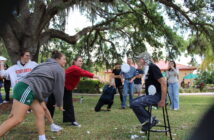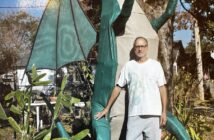
Mental illness is not a visual thing. It’s easy to pinpoint a runny nose and stuffed up chest and say it’s a cold. It’s a little bit harder to see the symptoms of a mental illness and pinpoint what’s wrong.
According to the National Institute of Mental Health, in 2013, 43.8 million American adults aged 18 or older were diagnosed with some form of mental illness, and this did not include the homeless, people on active military duty, or those in long term hospital stays, nursing homes, mental institutions or correctional facilities.
Despite the large number of people with mental illnesses, the vast population is not educated on the realities of mental illness. This is why Vincent House, an institution located in Pinellas Park, is set up to not only assist and promote individuals in recovery, but to also educate the public on mental health issues and those with them.
The founders, staff, and several members of Vincent House spoke here at Saint Leo on Nov. 12th to educate students and faculty on the realities of mental illness, and how Vincent House offers their help.
Elliott and Dianne Steele founded Vincent House 12 years ago after witnessing their youngest daughter’s struggle with schizophrenia. She was diagnosed just six months into her college career. Throughout finding help for their daughter the two came face to face with the broken psychiatric system, and together decided to leave their careers and try to change that.
Vincent House opened their doors in 2003, and since then has been thriving as a place to help and improve the social and vocational skills of those in recovery.
“Taking care of those without anyone else to take care of them is vitally important,” says Elliott Steele, co-founder of Vincent House.
Michael Ballenger, a Vincent House member since 2006, spoke at the event about his experiences. When he first started out, he was volunteering in the snack shop in Vincent House, and today he’s a small business manager.
To help members find their place again in the workforce, Vincent House has them go through several steps. First, transitional employment, where Vincent House creates relationships with outside employers and facilitates the employment of the member. From there they move on to supportive employment and then independent employment.
“There’s so much that they have to offer,” said Elliott Steele, referring to the members of Vincent House.
Angela Parker, another member of Vincent House, says that “[they]have been in my corner since the day I walked through their doors.”
While Vincent House works to help those in recovery, they complement medical care, and do not replace the need for psychiatric services. In a world where those with mental health issues are often overlooked, under cared for, and not very well understood, Vincent House stands strong in their mission to educate, help members in recovery, and restore hope.




